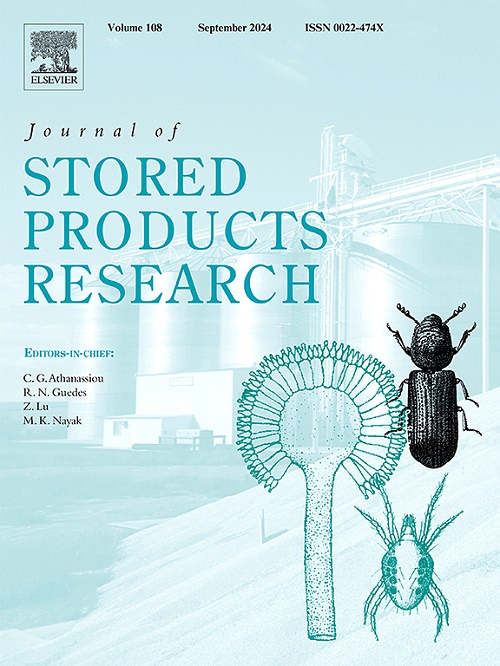Melatonin prolongs the shelf life of snow peas by regulating the antioxidant system
IF 2.7
2区 农林科学
Q1 ENTOMOLOGY
引用次数: 0
Abstract
Postharvest snow peas (Pisum sativum var. saccharatum) exhibit rapid quality deterioration characterized by chlorophyll degradation, tissue wilting, and accelerated senescence under ambient storage conditions. To address this postharvest challenge, we investigated the efficacy of melatonin immersion treatments (50, 100, and 500 μmol L−1) combined with refrigerated storage at the 4 ± 0.5 °C for 42 days. Experimental protocols involved a 30 s immersion in melatonin solutions followed by air drying (25 °C, 60 min). Researches showed the reduction of the rot rate in snow peas with 100 μmol L−1 melatonin treatment. Furthermore, its application effectively maintained good color and sensory quality, improved free radical scavenging power and metal reduction power, decreased reactive oxygen species levels such as H2O2 and O2·-, and promoted ascorbic acid - glutathione cycle, consequently elevating the levels of antioxidants as well as antioxidant enzymes. The results demonstrated that melatonin could be used as a fresh-keeping technology to improve the value and prolong the storage time of snow peas.

褪黑素通过调节抗氧化系统来延长雪豌豆的保质期
采后的雪豌豆(Pisum sativum var. saccharatum)在环境储存条件下表现出快速的品质劣化,其特征是叶绿素降解、组织萎蔫和衰老加速。为了解决这一采后挑战,我们研究了褪黑素浸泡处理(50、100和500 μmol L−1)并在4±0.5°C冷藏42天的效果。实验方案包括在褪黑素溶液中浸泡30 s,然后风干(25°C, 60分钟)。研究表明,100 μmol L−1褪黑素处理可以降低雪豌豆的腐烂率。此外,它的应用有效地保持了良好的颜色和感官品质,提高了自由基清除能力和金属还原能力,降低了H2O2和O2·-等活性氧水平,促进了抗坏血酸-谷胱甘肽循环,从而提高了抗氧化剂和抗氧化酶的水平。结果表明,褪黑素可以作为一种保鲜技术,提高雪豌豆的保鲜价值,延长雪豌豆的贮藏时间。
本文章由计算机程序翻译,如有差异,请以英文原文为准。
求助全文
约1分钟内获得全文
求助全文
来源期刊
CiteScore
5.70
自引率
18.50%
发文量
112
审稿时长
45 days
期刊介绍:
The Journal of Stored Products Research provides an international medium for the publication of both reviews and original results from laboratory and field studies on the preservation and safety of stored products, notably food stocks, covering storage-related problems from the producer through the supply chain to the consumer. Stored products are characterised by having relatively low moisture content and include raw and semi-processed foods, animal feedstuffs, and a range of other durable items, including materials such as clothing or museum artefacts.

 求助内容:
求助内容: 应助结果提醒方式:
应助结果提醒方式:


